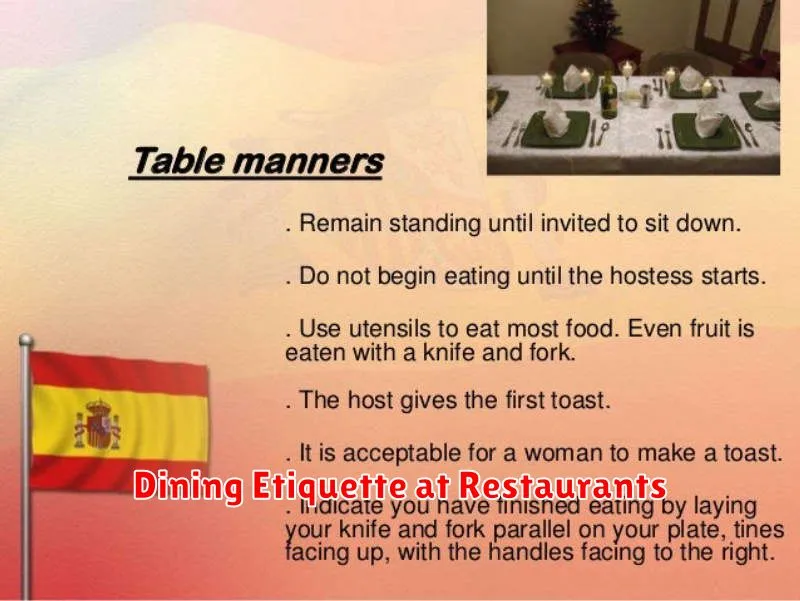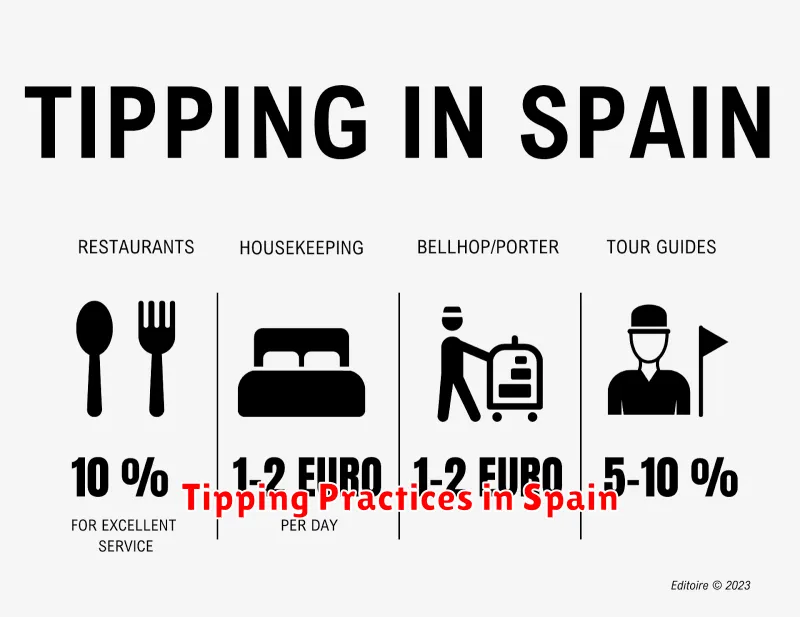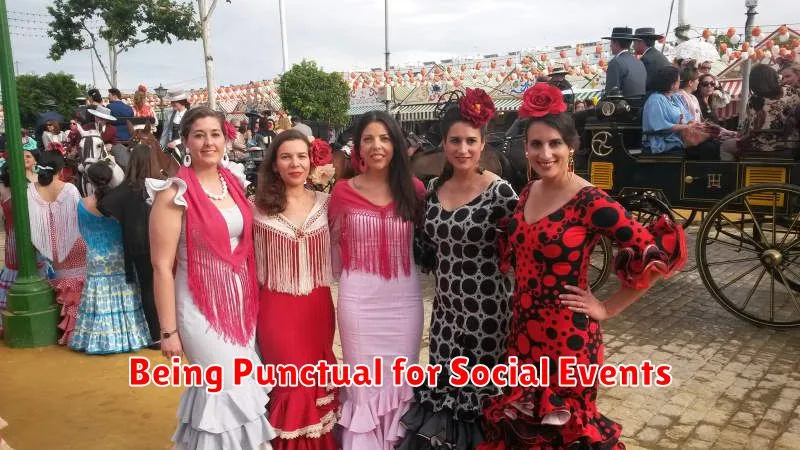Planning a trip to the vibrant and culturally rich country of Spain? Understanding Spanish cultural etiquette is essential for a smooth and enjoyable travel experience. From greetings and dining to bullfights and flamenco, Spain boasts a unique blend of traditions and customs. This guide outlines ten crucial cultural etiquette rules to ensure you navigate social situations with grace and respect, leaving a positive impression on the locals and fostering meaningful cultural exchange during your Spanish adventure. Mastering these etiquette guidelines will enrich your understanding of Spanish culture and allow you to fully embrace the Spanish way of life.
Whether you’re exploring the bustling streets of Madrid, relaxing on the beaches of Barcelona, or wandering through the historic alleys of Seville, observing proper etiquette in Spain demonstrates respect and appreciation for their traditions. From simple greetings like “hola” and “buenos días” to understanding the nuances of dining and tipping, these cultural norms may differ significantly from your own. By familiarizing yourself with these Spanish customs beforehand, you’ll not only avoid potential cultural misunderstandings but also enhance your interactions with the Spanish people, creating a more immersive and rewarding journey. This article will delve into ten specific etiquette rules that will help you seamlessly integrate into Spanish society and make the most of your time in Spain.
Understanding Spanish Social Norms
Navigating social situations in Spain requires understanding some key cultural nuances. Greetings are important. A handshake is common in professional settings, while friends and family often greet with two kisses on the cheek, starting with the right.
Mealtimes are often later than in other parts of Europe. Lunch is typically between 2 PM and 4 PM, and dinner can be as late as 10 PM. Be prepared for a more relaxed pace of dining. It’s considered polite to finish all the food on your plate.
Personal space is generally closer than in some other cultures. Don’t be surprised if people stand closer to you during conversations. Maintaining direct eye contact is viewed as a sign of respect and sincerity.
Dress code tends to be more formal, especially in professional settings. Paying attention to your appearance is a sign of respect. Although casual wear is acceptable in most social situations, avoid overly revealing or beach-style attire unless you’re actually at the beach.
Why Etiquette Helps You Blend In
Observing proper etiquette is crucial for fostering positive interactions and showing respect for Spanish culture. It demonstrates your willingness to understand and appreciate local customs, making it easier to connect with people and build relationships.
Blending in isn’t about erasing your own identity, but rather demonstrating cultural sensitivity. By adhering to etiquette guidelines, you avoid unintentionally causing offense and create a more harmonious experience for both yourself and those around you. This can lead to more genuine interactions and a deeper appreciation for the Spanish way of life.
While some cultural differences may seem small, they can carry significant weight. Acknowledging these nuances can greatly enhance your travels and contribute to a more immersive and respectful cultural exchange.
Greeting with Two Kisses

In Spain, a common greeting is the exchange of two kisses on the cheek, one on each side. This is a standard greeting between women, and also between women and men. It’s less common between men, who often opt for a handshake, especially in formal or professional settings.
Important Note: These kisses are not actual kisses, but rather light air kisses near the cheek. Don’t actually make contact with your lips.
The order of cheeks kissed can vary regionally, so just follow the lead of the person you’re greeting. This custom is a sign of friendliness and is practiced throughout the country in social situations.
Dining Etiquette at Restaurants

Meal times in Spain are generally later than in other European countries. Lunch is typically between 2 PM and 4 PM, and dinner is often not eaten before 9 PM. Be prepared to adapt to this later dining schedule.
It’s considered polite to wait for everyone to be served before beginning to eat. The phrase “Buen provecho” (enjoy your meal) is commonly used before starting to eat, although it’s not strictly obligatory.
Bread is often placed directly on the table, and it’s perfectly acceptable to do so. Using a fork and knife to eat everything, even things like fruit, is standard practice.
Tipping is customary, but not mandatory. A small tip of around 5-10% is generally appropriate for good service. Leave the tip on the table after paying the bill.
Finally, avoid asking for a doggy bag. While not unheard of, it is less common in Spain than in other countries.
Tipping Practices in Spain

Tipping in Spain is not as customary as in some other countries, like the United States. It is generally appreciated, but not expected in the same way. While not mandatory, it’s a polite gesture to acknowledge good service.
In restaurants, a tip of around 5-10% of the total bill is considered standard for good service. For smaller bills, rounding up or leaving a few euros is sufficient. For bars, tipping isn’t typically expected for just drinks, but leaving some spare change is a common courtesy.
For services like taxis, rounding up to the nearest euro or adding a small amount is appropriate. Hotel staff such as bellhops or housekeepers can be tipped a euro or two per service. In other situations like hair salons or spas, tipping is less common but can be done if you’re particularly pleased with the service.
Remember, tipping is always at your discretion and should reflect the quality of service you received. A genuine “gracias” (thank you) is always appreciated, regardless of the tip.
Being Punctual for Social Events

While Spaniards have a reputation for a more relaxed approach to time in some contexts, punctuality for social events is generally appreciated and demonstrates respect for your host and other guests. Arriving on time, or even a few minutes early, for dinner parties or other planned gatherings is considered good etiquette.
However, there is a subtle difference between being punctual and being too early. Arriving excessively early for a dinner party, for example, might catch your host unprepared and is generally seen as less considerate. A window of 10-15 minutes after the stated time is usually acceptable.
Respecting Siesta Times
The siesta is a cherished tradition in Spain, a period of rest typically observed during the hottest part of the day, generally between 2 PM and 5 PM. While not as universally practiced as it once was, especially in larger cities, it’s important to be mindful of its potential impact on your travel plans.
Many smaller shops and businesses may close during siesta hours. Plan your shopping and errands accordingly. Restaurants often have different operating hours during this period, with lunch typically served until around 4 PM and dinner not commencing until 8 PM or later. Be sure to check opening times in advance.
Although it’s not expected that you participate in the siesta, respect the tradition by maintaining a lower volume level during these hours. Avoid loud conversations, music, or other disruptive activities, particularly in residential areas.
Speaking Quietly in Public
In Spain, maintaining a moderate volume while speaking in public spaces is considered a sign of respect for others. Avoid loud conversations, especially in restaurants, shops, or on public transport. The Spanish appreciate a calm and peaceful atmosphere, and excessive noise is often viewed as disruptive and inconsiderate.
While lively conversations are certainly welcome amongst friends and family in private settings, modulating your voice in public demonstrates cultural sensitivity. This is especially important in quieter environments such as churches, museums, and libraries. Being mindful of your volume helps create a more pleasant experience for everyone.
Speaking softly doesn’t mean being inaudible. It simply means being aware of your surroundings and adjusting your volume accordingly. This respectful behavior will be appreciated by those around you and contribute to a positive cultural exchange.
Dress Code for Churches
When visiting churches in Spain, it is important to dress respectfully. This is especially true for prominent cathedrals and basilicas. Avoid clothing that is too revealing, such as shorts, sleeveless tops, or very short skirts.
Shoulders and knees should generally be covered. While some smaller churches might be more lenient, it’s always best to err on the side of caution and dress modestly.
Consider bringing a light scarf or shawl to cover your shoulders if needed. This can be easily removed when you leave the church.
Handling Money and Change
In Spain, it is considered polite to handle money and change with a degree of respect. Avoid tossing money onto a counter or handling it roughly.
When paying for goods or services, it is customary to present the cash or card directly to the cashier. Similarly, when receiving change, accept it directly from the cashier’s hand, rather than reaching across the counter.
While tipping is not mandatory in Spain, it is appreciated for good service. A small tip for services like dining or taking a taxi is customary. Round up the bill or leave a few euros on the table.
It’s worthwhile to familiarize yourself with the euro currency and common denominations to avoid confusion and facilitate smooth transactions. Using larger bills (e.g., €50, €100) for small purchases might be inconvenient for smaller businesses.

